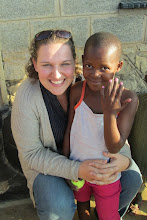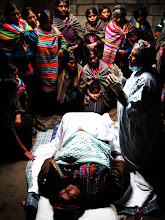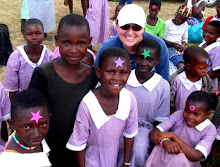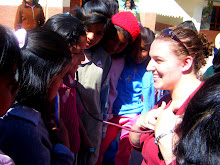There's a habit we have, as Americans... We have a tendency to idealize or fantasize about the "simple life." I see/hear it all the time... People talk longingly about a "simpler time and place," going "back to basics," a return to values and a forgone way of life. And as a PCV, people look at me with admiration for having attained this apparent "dream like" life. As if living without electricity and running water is some desirable life, a testament to a more honest or spiritually evolved way of life.
And I absolutely understand the fantasy... I was guilty of idealizing what it would be like to go "back to basics" before I came to Peace Corps. As if it was some more natural and evolved state of being "one with nature." Even during my first few months in Ha Selomo, I took pride in going to the pump to haul every ounce of water I used. I grew a garden and felt somehow superior for, for the first time in my life, living almost completely out of the reach of the global food market. I became a circumstantial vegetarian, simply because meat was expensive and difficult to buy. I felt like my new Peace Corps lifestyle was admirable, and told people I enjoyed "going back to basics" because I honestly did and do. But I was contributing to the same "idealization" I've now become frustrated with.
Living simply, in my eyes, is sometimes just another euphemism for living in poverty. My Basotho friends and neighbors are not lucky for having a "simpler" life. They are impoverished. And there's nothing beautiful, admirable, or noble about it. Americans project this fantasy of what an adventure it is to live without electricity, running water, or modern technology onto others. It's not a gallant, noble move to save the environment or get back to some more worthy way of life. It's suffering.
You know what life without electricity is? It's freezing cold. People die of cold here in Lesotho. Sickness sweeps through villages, attacking those too old, young, or sick to resist. Basotho literally FEAR the cold. They talk about it constantly. Like a superstition or imminent threat. I went to 7 funerals last year, in the span of 3 months during the winter. And you know what else no electricity means? It's dark. Pitch dark. As in children can't do homework and have to walk to school, through the mountains before the sun even rises. And two days ago, I had to show my 12th graders a picture of astronauts in space on my blackberry phone. They were SHOCKED to see a space ship. They had no idea giant structures like this were circling, just outside Earth's reach. Watching the realization wash over their faces was amazing. These are kids graduating from high school, and they didn't know what a space ship, a space suit, or zero gravity looked like. THAT'S life without electricity and technology. My kids have a limited ability to experience the world. They don't have television or computers or internet or smart phones. They don't know what the ocean looks like as the waves hit the sand, or what a lion sounds like when it roars.
I'm not saying all the advancements of modern technology are positive, but I am saying that thinking that life without them is a noble act is naïve. It's not noble to die of freezing cold or to limit a child's education. My life here without electricity only approaches exciting and adventurous because I have enough money to afford heavy blankets and a gas heater- luxuries my Basotho friends and neighbors don't have.
So the next time you hear someone longingly dream of a "simpler way of life" or going "back to basics" remind yourself that there are people around the world living that way RIGHT now. And there is nothing "simple" about it.
With Love from Lesotho… Mary E.






No comments:
Post a Comment